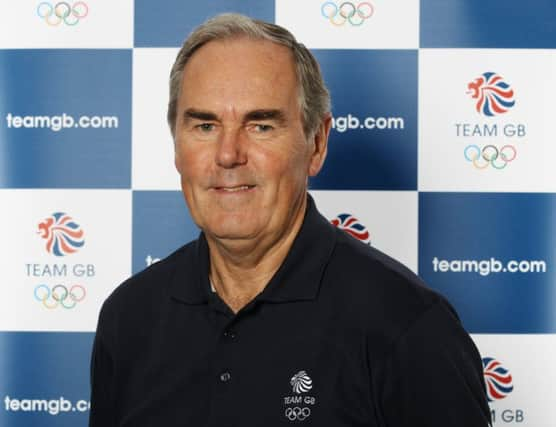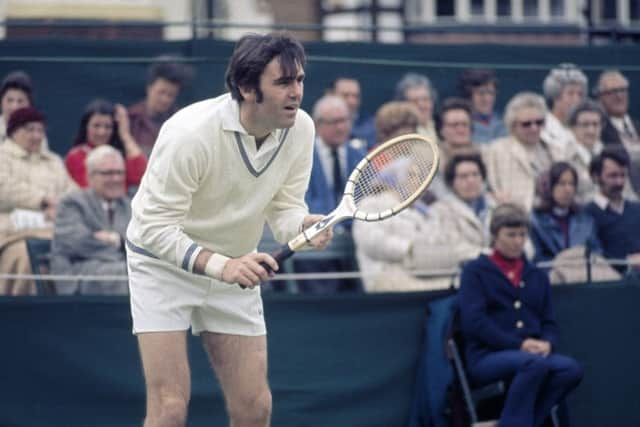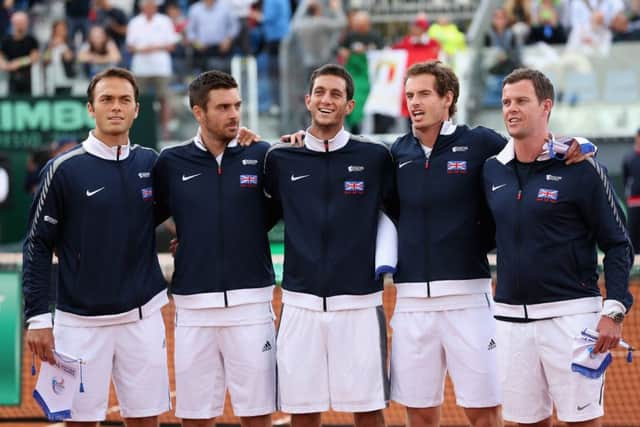Interview: Former Davis Cup captain Paul Hutchins


The All-England Club, you imagine, must be quite a peaceful place during those 50 weeks of the year when the home of British tennis and indeed the entire daft-hat nation isn’t willing Andy Murray to win another Wimbledon title. A place, indeed, when its members can drop in for tea, natter to some fellow great hopes in whites from the pre-Andy era, or just sit in quiet contemplation.
“I’ll tell you what it’s like,” laughs Paul Hutchins. “Every morning Buster Mottram turns up to read the morning papers. And then he pontificates about something with which he’s in ideological disagreement. There’s always something and he pontificates to me every morning. Then, when he’s done, I say to him, ‘Buster, are you coming to Belgium?’, but he says: ‘Too much hassle.’ Buster is a south-west London guy, not the kind to go hopping on Eurostar. But I’m going to keep asking him.”
Advertisement
Hide AdAdvertisement
Hide AdThe last British team to reach the Davis Cup final have been invited to Ghent for this year’s showdown with Belgium. The men of 1978, captained by Hutchins, comprised Mark Cox, the Lloyd brothers David and John – and a player who, you might be surprised to know, shares some traits with our Andy, according to his old skipper.


“Four very different personalities,” says Hutchins. “Mark was Cambridge University, very straight. David was a firebrand, pugnacious and the opposite of his brother who was laid-back, good-looking and never out of the gossip columns. And then there was Buster who was eccentric and a complete one-off.” “Thank God,” he must mean.
Mottram was well-known for his right-wing views. When so few sportsmen appear to pay attention to politics, or are too timid to express an opinion, should we be grateful that one of them did? But Buster – real name Christopher – was a National Front sympathiser. He thought Enoch Powell was onto something. At the last Euro elections but one he tried to broker a pact between UKIP and the BNP.
It is not in politics that Hutchins believes Mottram and Murray chime. Nor indeed in a flair for songwriting which Mottram demonstrated when he teamed up with all-round 1960s entertainer Kenny Lynch for the ditty Average Man. “Kenny was one of the guys in the tennis set but I didn’t know that about Buster,” says Hutchins. The single appeared to sink without trace in the 1980s but it would seem to confirm that Mottram was far from your average eccentric.
“I think the guys share a certain cussedness,” adds Hutchins. “Andy is the talisman of this Davis Cup team, just as Buster was of his, and you expect him to win his two matches. Opponents disliked playing Buster because he was so consistent and I think the same is true of Andy. And just as Andy hates losing, really hates even one point going astray because of an unforced error, that was Buster, too. But, ha ha, I think the similarities end there.”


I must admit I wasn’t expecting Hutchins to be quite so much fun. A squint at his cv – 12 years the Davis Cup captain, twice in charge of the men’s game and now holding the title of Wimbledon’s Tournament Director – suggests he must be in with the tennis-establishment bricks. Now 70, he’s one of the sport’s ineffably polite old boys, for sure, but he has some interesting – and pointed – things to say about modern sporting hype, grandstanding coaches, insincere players and show-off fans. And I really didn’t think he’d tell me about the time the younger Lloyd turned up late for a Davis Cup semi-final having been canoodling with Chris Evert.
He’s the father of Ross Hutchins, a good friend of Andy’s since the pair met in an under-ten’s match in Scotland and a doubles partner of Murray’s brother Jamie, who was the British No 3 when diagnosed with Hodgkin’s lymphoma in 2012. The very moment he began chemotherapy Murray dedicated his Brisbane International win to “one of my closest friends who is back home watching: you are going to get through it.” Murray then helped Paul organise a star-studded mini-tournament which raised more than £350,000 for the Royal Marsden Cancer Charity.
“Ross is doing very well now, thank you,” says Hutchins. “He’s got a good position with the ATP [Association of tennis Professionals] as vice-president of player relations and he’s in good shape. He’s very faithful, is Andy. He’s been very faithful to Ross over the years and that’s a very strong trait he’s got. The boys have known each other a long time, both families likewise, and Ross has helped Andy down the years. But I really respect Andy’s faithfulness because I think too many sportsmen nowadays flit around and say things for PR. Andy doesn’t do that. People say Andy should be a little bit more like this or a whole lot more like that but he’s his own man. You either approve or you don’t but you should get aboard because that’s Andy.”
Advertisement
Hide AdAdvertisement
Hide AdHutchins’ lifetime in the sport started on the lawns of Bristol Tennis Club. “I could play reasonable, okay tennis. I had a sound temperament and I tried hard,” he says of a career cut short by injury at 25. He made the team for the 1968 Davis Cup when Britain fell in Barcelona, beaten by Spain. “I wasn’t particularly good on clay and Manolo Santana was brilliant on it.”
At 31 he became national team manager. He would captain them for 31 Davis Cup ties – still a record. It was a young appointment and his inexperience in the role would be seriously tested by Mottram. But he showed the man-management skills to handle the bold Buster, get the best out of him as a player and in the end some kind of friendship was formed.
When I first mention politics to Hutchins I’m actually thinking of the numerous protests directed at 1970s sport including tennis. In 1975, his first year in charge, the Davis Cup saw thousands muster in Sweden to oppose Augusto Pinochet’s military junta in Chile and release balloons featuring the names of hundreds of political prisoners – while three years later, as Britain were marching to the final, it was the Soviet Union’s turn to have a beef with Chile and another four countries withdrew over South Africa’s participation. Anti-apartheid demonstrators also numbered in the thousands and when South Africa listed their first-ever “coloured” player, the move was condemned as tokenism. But my question throws our man; he was anticipating one less global, more local. “I thought you were going to ask me about the political situation with Buster!” he laughs. “Buster was highly controversial. About tennis, the LTA [Lawn Tennis Association] and of course politics. He had the right to feel strongly about politics but his views caused some difficulties for us and there would be protests [against Mottram’s inclusion in the team] at our matches. But, you know, the National Front exploited their poster boy. I think they made rather more of him than he did of them.
“He and I didn’t hit it off at the start; we fell out big-time. I was young and new to the job and, well, he was Buster. I’d said something about his game, not being too pleased with how he’d just played at Wimbledon. Players don’t like a captain or a coach stating the truth publicly.
“He was a massive challenge for me as leader of the team. We had lots of rows. He didn’t like training and he didn’t like playing dead-rubbers. But as a captain you simply have to get your top man playing. Leon Smith has done that with Andy and I did it with Buster. It would have been very easy to get completely hacked off with Buster about something he’d said about me and dump him on the sidelines but we need our No 1s.”
Now Hutchins is chuckling as he recalls Mottram’s perverse sense of humour. “One of those dead-rubbers was in 1978. We were four-nil up against Czechoslovakia who had a 17-year-old called Ivan Lendl in their team. Similar to the 18-year-old John McEnroe we met in the final that year, he looked an exciting prospect and it was a privilege to see both of them emerge. Anyway, I made Buster play the last match against the Czechs and he wasn’t happy. He purposefully lost the first two sets to prolong our stay in what was a freezing cold Eastbourne when we all just wanted to get home. Then he turned the match around and won the last set to love. It wasn’t funny at the time but I can laugh now.
“The team would get invited to parties in foreign embassies and there would be a moment I came to dread when Buster would tap his glass and threaten to make a speech. Once, feeling particularly strongly about some political issue or other, he wrote a letter to Mrs Thatcher and signed it ‘ … on behalf of the Davis Cup team’. That was his humour. He was awkward, he was persistent, he was one down from unique although I don’t know what you’d call it. He could make life very difficult but he could also make it fun because he was very self-deprecating and, boy, did he come through as a competitor. He was fantastic.”
Hutchins clearly feels Mottram has been an unsung hero for long enough, pushed into the shadows because of his extremism. He consistently achieved stirring victories for his captain, although when a spot of bother broke out he was usually slap-bang in the middle. Beating Spain’s Jose Higueras didn’t go down well with the Barcelona crowd, some of whom stormed the clubhouse and hammered on his locker-room door. And his defeat of Italy’s Adriano Panatta in Rome was similarly unpopular, causing coins to rain down from the stands. “Panatta was a national hero with his matinee-idol looks and Buster just chopped him up,” recalls Hutchins. “We were given a security detail after that but Buster disappeared into town with this fellow, leaving us stranded.” Mottram’s greatest win, though, came in the 1978 final in California, Britain’s first for 63 years. “He hadn’t been able to play all week because of injury and was two sets down to Brian Gottfried [then ranked No 5 in the world]. But he fought back, won the match brilliantly. Buster really tried my patience sometimes; I had to put up with a lot. But he really paid in return with his performances.”
Advertisement
Hide AdAdvertisement
Hide AdBritain would eventually lose 4-1 to the McEnroe-inspired USA but it had been a great run. The semi-final victory over an Australia team including Tony Roche had been a thrilling affair at London’s Crystal Palace and for Hutchins, who remembers ties in his playing days being fairly sedate, this was the first evidence of fan-fervour in the competition. “That was when the promotions guy at the LTA started to get the flags out.”
But there was a bit of off-court drama beforehand because of “Legs” Lloyd’s love-match with future wife Evert. “John had been with Chris and had turned up late. David, who was the most fiery of characters, didn’t approve of that and had a real go at him. That’s brothers for you. Jamie’s had a go at Andy a couple of times, hasn’t he? But it was all sorted out.”
Hutchins stood down as captain in 1987, the year Andy was born, Britain having reached the semi-finals three years after Mission Hills. Not bad, he thinks, when compared to the far more expectant Tim Henman-Greg Rusedski era. “You’d have thought these guys would have got us to a final or a semi but did they even win a match?” He’d love to have had Murray in his team, obviously, but was glad to have led Britain when he did, being less enamoured with aspects of sport now. “There’s more sabre-rattling about achievements these days and I find it overbearing. I was relaxed about my losses and relaxed about my wins. Because there so much promo around, people do things for show too much and that’s not me.”
As well as the self-regarding practitioners of sport, he also reproaches the fans. “The crowds for the Davis Cup are really pumped up now. I like that to some degree but they have to be careful not to go over the top. I don’t like when supporters jump up and down with their flags when they see the TV cameras are on them and I don’t particularly go along with the view that we need an unbelievable crowd to win. My teams achieved some incredible victories in Italy and France when there were hardly any Brits present.”
And so to Ghent. Hutchins thinks Britain can triumph although the team mustn’t be over-dependent on Andy and those excitable fans shouldn’t assume the top man will win his own matches easily. Nevertheless he’s full of admiration for Murray. “He’s always been an exceptional tennis player but now he’s shown himself to be an exceptional character, not just in his commitment to the Davis Cup but his dedication to winning. I know that Novak Djokovic, Roger Federer and the others are dedicated but I really believe that Andy is the most dedicated player there is.”
Fine words. Wonder what Buster would say?